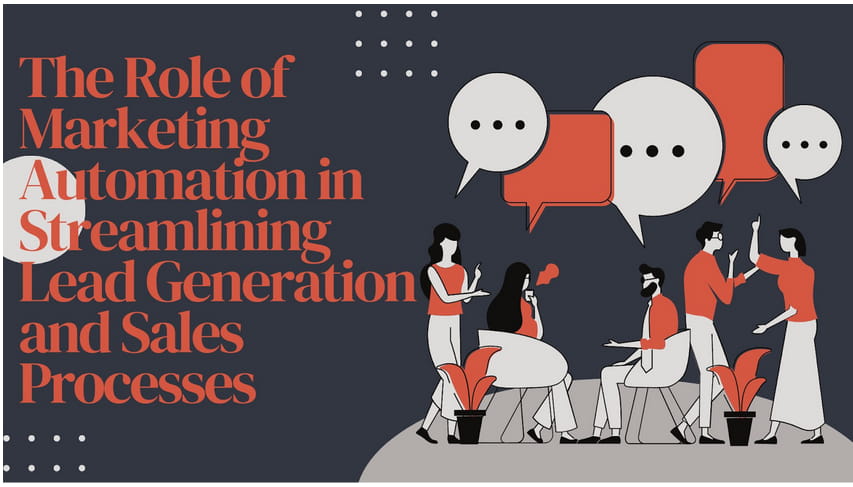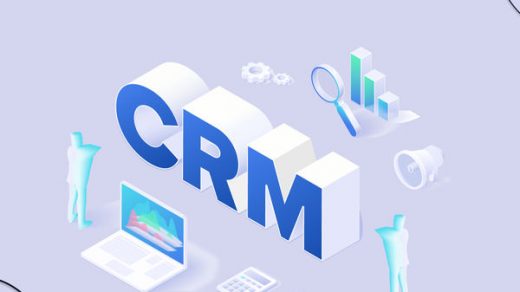
Businesses confront intense competition in the fast-paced digital world of today, and they need to come up with creative solutions to stay ahead. Effective lead generation and optimized sales operations are essential to any successful company.
The development of marketing automation has enabled businesses to improve their lead generation strategies and sales procedures. This article will examine marketing automation’s function in streamlining lead generation and sales processes. Highlighting its advantages and salient characteristics.
What Is Marketing Automation?
Marketing automation refers to using software and technology to automate various marketing processes and tasks. It requires utilizing software platforms, tools, and systems to streamline, manage, and automate repetitive marketing processes and eventually increase efficiency, productivity, and effectiveness.
By using marketing automation, businesses can automate operations. Including lead generation, lead nurturing, email marketing, social media management, customer segmentation, campaign tracking, and reporting.
It enables marketers to design individualized and targeted advertising campaigns, interact with customers and prospects on a large scale, and distribute pertinent information and messages in response to predetermined triggers and user behavior.
Key characteristics of marketing automation solutions frequently consist of:
- Email Marketing Automation: It entails developing and distributing automated email messages based on triggers, such as user behaviors or particular periods.
- Lead Management and Nurturing: Lead tracking, lead scoring based on interaction, and automatic follow-ups are all ways that lead management and nurturing help.
- Customer Segmentation: It can create customer segments with marketing automation based on various factors, including behavior, purchase history, engagement level, and demographics. It enables more specialized and focused marketing campaigns.
Roles of Marketing Automation
A company’s marketing strategy includes marketing automation in several crucial ways. These are a few of the main functions of marketing automation:
- Lead generation: use lead generation strategies like landing pages, forms, and gated content. Marketing automation helps produce and collect leads. It lets companies automate the processes of lead generation. Lead segmentation, and lead nurturing freeing marketers to concentrate on high-quality prospects.
- Lead nurturing: Through personalized and automated contact, marketing automation helps nurture leads. To nurture leads through the sales funnel and increase the likelihood of conversion. Marketers may offer personalized content and messages at the perfect moment by analyzing user activity and interaction.
Personalized and Targeted Campaigns
Appointment setters must have strong communication, organizational, and strategic thinking skills to engage potential customers and b2b appointment setters for a particular campaign or sales initiative.
The following crucial competencies are essential for appointment setters in personalized and targeted marketing:
- Communication skills: Strong communication abilities are a must for appointment setters if they want to engage potential clients properly. They are attentive, speak effectively, and communicate the campaign’s value proposition.
- Product knowledge: Understanding the offered commodity or service is crucial for appointment setters. They ought to be prepared to handle any issues or objections potential clients raise during the meeting and respond to simple questions.
- Research and targeting: Appointment makers must be skilled in researching to find and successfully target possible prospects. Personalizing the conversation and highlighting pertinent benefits involves learning about the prospect’s industry, business, and particular needs.
- Persuasion and objection handling: Strong communication abilities are a must for appointment setters if they want to engage potential clients properly. They are attentive, speak effectively, and communicate the campaign’s value proposition.
- Organization and time management: Understanding the advertised good or service is essential for appointment setters. They should be prepared to handle any issues or objections potential clients raise during the meeting and respond to simple questions.
- CRM and technology proficiency: Appointment makers need to be skilled in researching to find possible prospects and successfully target them. Personalizing the conversation and highlighting pertinent benefits involves learning about the prospect’s industry, business, and particular needs.
- We can include a range of client profiles and sectors in personalized and targeted campaigns. Appointment makers should be flexible and able to grasp various business settings to modify their strategy swiftly. They must also possess resilience and deal with failure or rejection without losing their drive.
What are the Streamlining Sales Processes
In marketing, automation refers to using technology and automation solutions to enhance and simplify critical phases of the sales cycle. Marketing automation software is use to automate repetitive procedures, increase efficiency, and boost the overall efficacy of sales operations.
The following are crucial components of implementing marketing automation to streamline sales processes:
- Lead Management: Marketing automation collects, tracks, and groups lead in a centralized database to simplify lead management. It automates lead scoring, qualification, and routing processes to ensure that leads assign to sales professionals per predetermined standards or guidelines.
- Automation of the Sales Funnel: Marketing automation makes it possible to automate the many phases of the sales funnel, including lead nurturing, follow-up communications, and personalized interaction. To distribute relevant information, monitor prospect interactions, and expeditiously move leads through the sales pipeline, automated processes, and triggers can be set up.
- CRM Integration: By integrating marketing automation (MA) with CRM (customer relationship management) systems, data can synchronize easily, and customer interactions may be more precise. It helps sales teams to manage communication histories, access up-to-date lead and client information, and prioritize sales tasks.
- Management of Sales Material and Content: Marketing automation tools make organizing, controlling, and sharing sales material and content more accessible. Sales staff can engage prospects and close agreements more effectively by accessing and sharing pertinent materials like product brochures, case studies, or sales presentations.
The Lead Nurturing and Drip Campaigns
Are appointment-setting strategies used to interact with and develop connections with prospects over time? These tactics emphasize retaining potential consumers’ attention and giving them helpful information. And subtly guiding them toward purchasing.
The systematic practice of interacting with and nurturing leads with relevant, tailored information over time is called lead nurturing and drip campaigns in the context of marketing automation. Personalized messages and helpful information distributed to prospects at various stages of the buyer’s journey utilizing marketing automation tools and tactics.
The following are crucial components of drip campaigns and lead nurturing in the context of marketing automation:
- Lead segmentation: Marketing automation enables the division of leads into different groups according to various factors, including behavior, engagement level, or demographics. For the distribution of specialized messaging and material, this segmentation aids in creating focused groups.
- Personalization of information: Marketing automation allows altering and adapting information based on different leads’ requirements and preferences. By utilizing data and automation, marketing professionals may send prospects timely, relevant communications that resonate with them.
- Automated drip campaigns send leads a succession of automated, timed emails or communications over a predetermined time. Drip campaigns enable marketers to send communications that inform, nurture, and inform principals through the sales funnel. Marketing automation technologies make drip campaigns easier to create and administer.
Data-driven Insights and Analytics
Analyzing and interpreting data to obtain valuable insights and make defensible decisions on marketing strategies and campaigns is known as data-driven insights and analytics in the context of marketing automation.
Platforms for marketing automation offer tools and capabilities that let companies manage and evaluate numerous metrics, keep track of how healthy campaigns are performing, and gain insightful information from the data. In the context of marketing automation,
The following are essential features of data-driven insights and analytics:
- Data collection: Marketing automation tools assemble and compile information from various sources, including user interactions with websites, emails, social media, and customers. In a centralized system, this data is organized and saved for analysis.
- Tracking and Monitoring: Key Performance Indicators (KPIs) and metrics pertinent to marketing campaigns, such as email open rates, click-through rates, website traffic, conversion rates, and consumer behavior, are tracked and monitored by marketing automation solutions. The effectiveness of marketing initiatives can be seen in real-time thanks to this tracking.
- Targeting and audience segmentation: Using data-driven insights, marketers can divide their audience into subgroups according to behavior, interests, and level of involvement. This segmentation enables more individualized and tailored message and campaign targeting.
Advantages of Automating Your Lead Generation and Sales Processes
Businesses can benefit from the automation of lead generation and sales processes in several ways.
Here are several significant advantages:
- Enhanced Efficiency: By automating manual and time-consuming procedures, your team can concentrate on high-value activities. You may expedite operations and lower the risk of human mistakes. Guarantee dependable and timely follow-ups by automating the lead capture, nurturing, and qualification processes.
- Improved Lead Quality: Automation aids in lead quality and scoring, allowing you to prioritize and concentrate on leads most likely to become clients. You can ensure that leads are appropriately nurtured and engaged. Boost the conversion likelihood by adopting lead scoring criteria and automating information nurturing activities.
- Faster Sales Cycles: You can cut the sales cycle in half by automating repetitive sales operations. It may effectively push leads through the sales funnel with the use of automated workflows, which can initiate follow-up actions, send automatic reminders, and set up appointments.
Final Thought
Marketing automation is crucial for streamlining lead generation and sales operations in a highly competitive corporate environment. Marketing automation enables firms to maximize their efforts.
Increase conversion rates and overall income by automating monotonous tasks, personalizing campaigns, optimizing sales processes, and offering data-driven insights. Organizations may remain ahead of the competition, promote growth, and provide excellent client experiences by embracing marketing automation.




Recent Comments